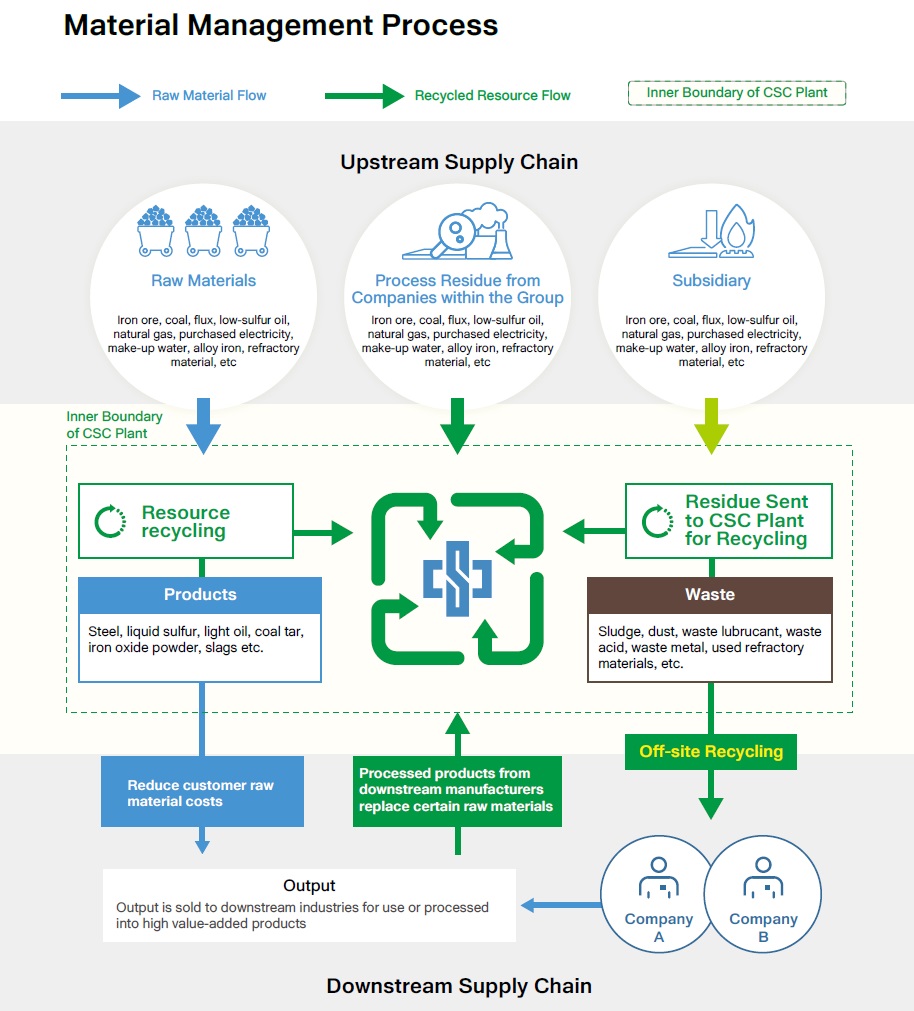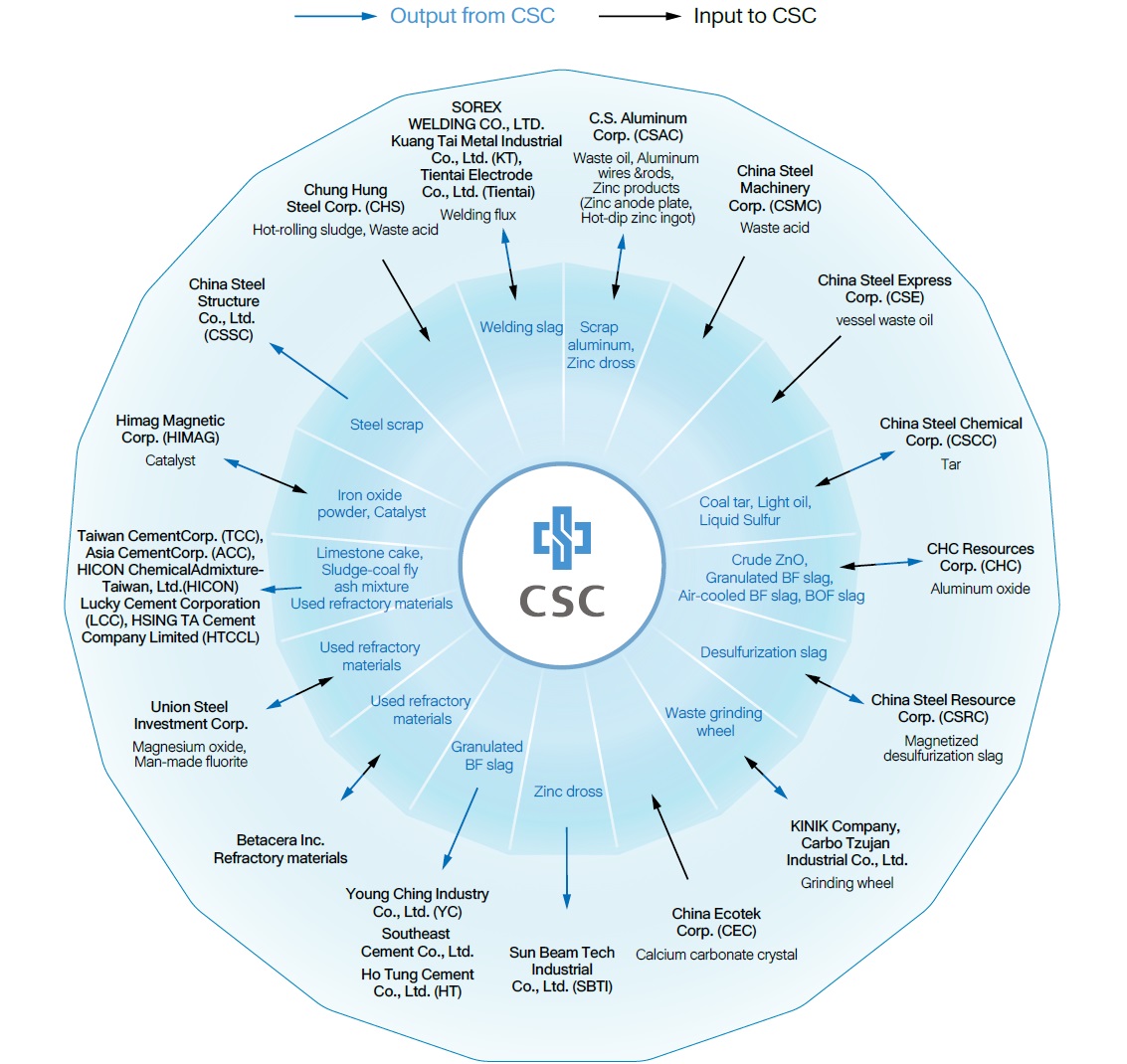Pollution and Waste Management
Policies or Commitments
Before planning a production process, CSC will conduct process feasibility studies, develop by-product applications, and design waste recycling. The possible impact on the natural environment will be included in relevant assessments, and risk identification will be completed. In order to reduce the impact on the environment caused by operational processes, CSC upholds the concept of a steel life cycle and is committed to recycling process waste by developing application techniques for various resources. At the same time, it integrates resource links inside and outside the Linhai Industrial Park to help utilize available resources. In addition to properly utilizing business by-products and waste within the mill to reduce the risk of outsourcing, CSC also reduces production costs and reaps the benefits of circular economy.
Targets
CSC has set up short-term, mid-term, and long-term targets for waste management. In order to achieve the targets continuously, CSC has developed a management plan and continues to promote the expansion of resource utilization for various waste and by-products through measures such as self-management, third-party verification, research and development, and training within the group.
| 2024 Goals | Goal management results | 2025 Goals | 2026/2030 Goals | 2031 Goals | |
|---|---|---|---|---|---|
| Waste Management Goals |
Waste recycling ratio reaches over 90%, and zero solidification landfill.
(Reference to the total amount of waste in 2024 of 505,170.73 tons, the total waste disposed should be less than 50,517.1 tons.) |
|
Waste recycling ratio reaches over 92%, and zero solidification landfill. | Waste recycling ratio reaches over 94%, and zero solidification landfill. | Waste recycling ratio reaches over 94.1%, and zero solidification landfill. |
Implementation Results
CSC has demonstrated outstanding performance in waste reduction as well as in-plant and off-site recycling. After years of hard work and close cooperation with the academia and other industries, CSC reached the “zero-solidification landfill” milestone for the first time in July 2001. By having implemented the aforementioned management policies, CSC had disposed of 505.170.72 tons of waste generated in total, and the waste output per metric ton of crude steel was 63.88 kg in 2024. The resource utilization rate of waste reached 94.8%, with 96% of waste being internally reused, reducing the burden on the environment.

Total waste recycled/ reused(1)
| Item | 2020 | 2021 | 2022 | 2023 | 2024 | |
|---|---|---|---|---|---|---|
| Total Recycled material | 4,716,606.2 | 5,685,690.83 | 5,377,717.06 | 5,444,003.42 | 5,367,032.11 | |
- CSC modified the calculation method of total waste recycled/ reused by including the recycled/reused by-products. According to the regulations of Taiwan's Ministry of Environment and the announcement of the Ministry of Economic Affairs, CSC registers coal tar, light oil, BF slag, desulfurization slag, sludge-coal fly ash mixture, mill scale, liquid sulfur, and burnt lime as the by-products rather than waste. Therefore, "the total waste recycled/ reused" included both waste and by-products.
Statistics of waste directly treatment by CSC
Unit:tonnes
| General Industrial Waste | 2020 | 2021 | 2022 | 2023 | 2024 | |||||
|---|---|---|---|---|---|---|---|---|---|---|
| Onsite | Offsite | Onsite | Offsite | Onsite | Offsite | Onsite | Offsite | Onsite | Offsite | |
| Incineration (with energy recovery) | 26,944.4 | 1,342.4 | 27,711 | 1,225.7 | 28,310.4 | 1,105.7 | 26,221.9 | 301.9 | 26,024.82 | 184.38 |
| Total of waste directly treatment | 28,286.8 | 28,936.8 | 29,416.1 | 26,523.8 | 26,209.2 | |||||
Industrial Ecological Network
The by-products produced by CSC include BF slag, BOF slag, iron oxide powder, desulfurized slag, sludge-coal fly ash mixture, etc. Except for the water-quenched BF slag, which is sold to domestic manufacturers, the rest are processed by CSC's affiliated companies and then supplied to the chemistry, construction, civil engineering, and electrical machinery industries. The resources can be effectively reused, which has expanded the industrial ecological network in both the Linhai Industrial Park and areas outside the industrial park. As the resource reutilization rate is improved, the impact to the environment due to long-distance transportation of the cleaning vehicles is mitigated, which brings benefits of the reduction of carbon emissions and fulfills CSC's corporate social responsibility.
Implementation Results
There were 34 enterprises in the industrial ecological network with CSC being the core in 2024. Based on the internal and external resource links established in the past, CSC will cooperate with the government fully to continue to promote the plan of “Energy and Resource Integration in Industrial Parks " to expand the waste recycling operations with other manufacturers and build a resource sharing and recycling network among industries in the Linhai Industrial Park. Moreover, CSC will improve the industrial operating conditions, enhance its competitiveness, and gear to the international trend for sustainable development.
In 2024, CSC produced 4.611 million tonnes of by-products from manufacturing processes (wet basis).

Industrial Ecology Network
